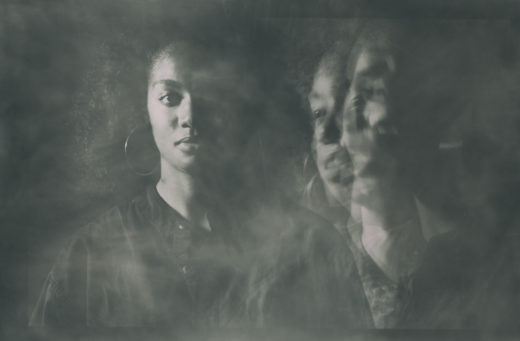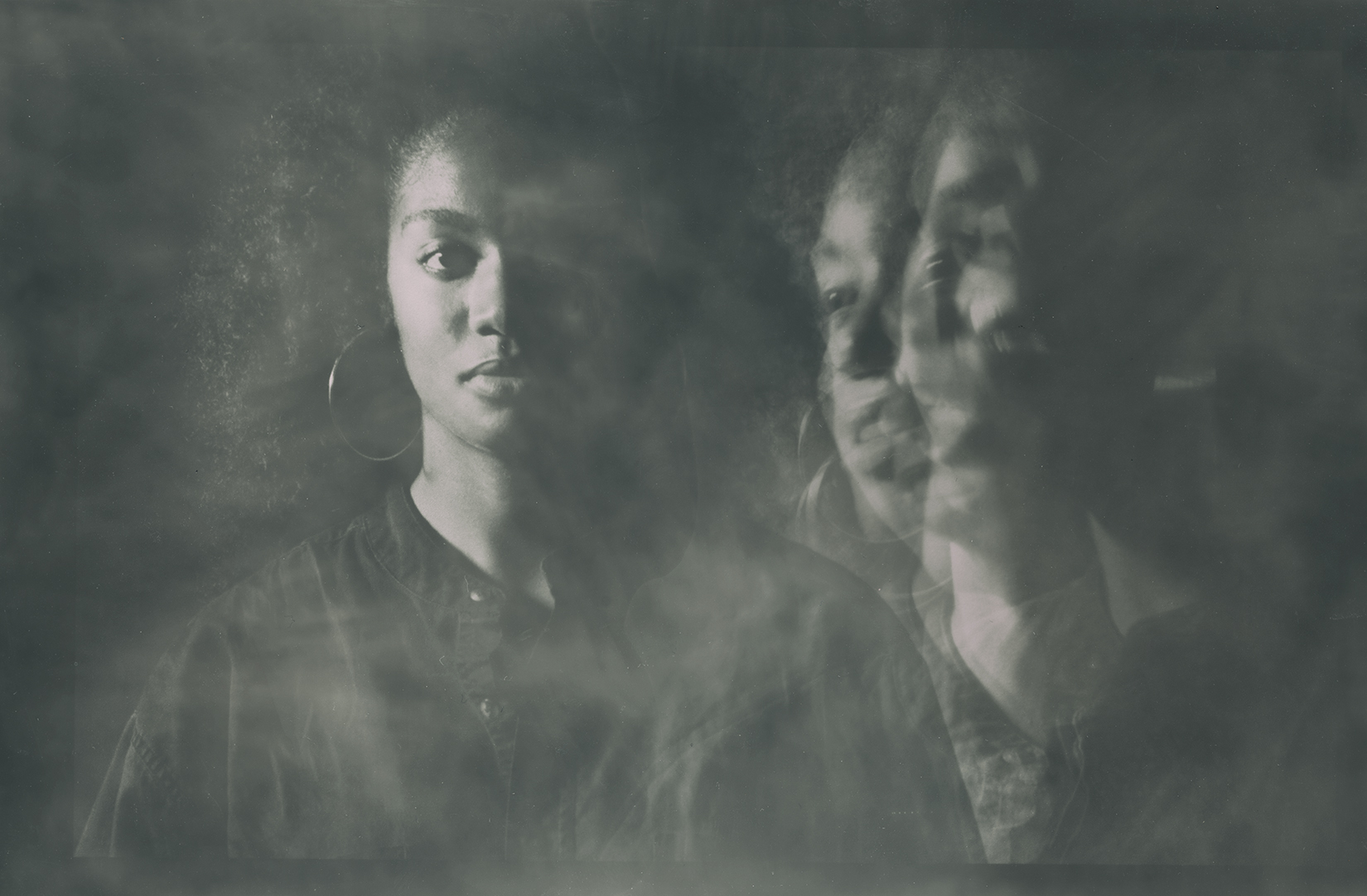IN THE PINES
A.M. Constantine
 Sudeep Bhargava, She Never Knows Who, image courtesy of YoungArts
Sudeep Bhargava, She Never Knows Who, image courtesy of YoungArts
1.
After I dropped my kids off at their mom’s place, I went back to my house to clean and start drinking. This was how I handled switch days and preparing myself for a week in an empty house: to get through it, I had to close their bedroom doors, put the kids’ possessions out of sight, hide all visible evidence of their existence. The contrast of silence in their absence was so stark that it made my ears ring, and every dumb noise of my own body—a clearing of my throat, a crack of my knuckles—took on an exaggerated volume, like I was wearing a microphone. It all made me want to escape myself.
I tried sitting down in my big chair. I had a book I’d been meaning to read by a Norwegian writer whose name I can never remember. I opened it and closed its cover a few times. I stared at the book, listening to the silence of my house with suspicious melancholy, hoping I’d just heard a noise but knowing I hadn’t.
I had a new therapist. She likes to say, “Accept the reality of the present.” This involves thinking the thought, It is what it is. I looked around the empty room and thought that. This is what it is.
It was a thought I was able to have anywhere. So I decided to go have that thought at George’s Bar.
Sunday night meant a sparse but loyal crowd that included several other divorced parents. We all followed the two unspoken rules of the Switch Day Blues. First, we could trash-talk our exes all we liked, but there was to be no mention of kids. No pictures from the weekend just past, no stories about their silly retorts, no tales of athletic field triumph. Second, we all had to make transparent, unconvincing attempts to hide our feelings of raw vacancy: laugh louder than necessary at a joke you don’t understand. Watch the football game and cheer when either team gets first down.
I hid my pain out of respect for others who hid their pain out of respect for me; it was the only time I didn’t feel alone in my heartache. It was beautiful just to be part of it, although I usually just sat by myself drinking rye whiskey—on the rocks, with a beer back. Melissa, the bartender, was cute, and sometimes she’d engage me in hospitality-level flirting, but I didn’t want to try for more with her or any of the regulars. The sanctuary of George’s was too valuable. I couldn’t escape my grief, but being in that bar let me put it on a short leash for a few hours. Watch it circle around me instead of feeling it sit on my chest. There were plenty of other bars I could go to if I got horny. Sometimes I did.
This is why I almost left when Stella walked in. She was a new face and the prettiest one I’d seen in a long time. It was January, the dead center of bitter cold Iowa winter, but her giant coat and fur-trimmed wool cap seemed suited to even more extreme weather. I could picture her on a sled, leading a mountain top search party expedition, coming to someone’s rescue.
Maybe mine.
She took off her coat and Melissa brought her a Diet Coke and a plate of lime wedges without her ordering, so I knew she was local. She had her rituals down. I told myself to look away, but then watched her crack the can and pour the slow-foaming cola over a glass of ice like a television commercial. She sucked two of the limes directly and put the third into her drink.
I realized I liked her, and realized how good the thought of me liking her, or anyone, felt. I hadn’t expected to like someone ever again.
I tried to let that excitement be enough.
But it was winter and I had a big empty house waiting for me and I was entering the early stages of a deep drunk. Not the kind that gets you lusty and kissing a stranger. The kind where the thought of your empty bed puts air in your palms like you’re walking towards a cliff.
I ordered a third rye.
She saw me looking over at her and smiled. I don’t usually go through windows like that, even at other bars, but I found myself talking.
“I guess you like limes,” I said. She stared at me without talking, so long I got nervous. It was uncomfortable and I wanted to look away, but worried she was testing me. Finally, she smiled and turned back to her soda, apparently satisfied. Like now she knew all there was to know about me.
I guess I felt like she did, like the two of us were close. It made me bold, along with the booze, and my panic. I thought of entering my house, its quiet sharp in my ears.
“I got some limes at my place,” I said. “Several. Like six or seven.”
When she glanced back up at me, I knew I’d disappointed her.
“No thank you,” she said. “Excuse me.” She got up and went to the bathroom.
When she was out of earshot Melissa started laughing—she’d heard the whole thing. “I’ve never seen you make a move before,” she said. “You’re no good at it.”
I stood and winked at her. “I’m no good,” I said. I took the rest of my drink in a gulp and when I handed her the empty glass I smiled so she wouldn’t think I wasn’t hurt. But when she turned to ring me up, I took out a pen, flipped over Stella’s coaster, and wrote Sorry. Then I put my number on it. I felt stupid before I did it, when I was doing it, and after I left.
Back home, as a kind of penance, I tried to fall asleep without pills. I let myself toss and turn for a few dark hours. But then I took them. My moods get worse without sleep and oblivion is the only cure for loneliness.
The last thing I heard before things went blank was the wind, its slow moan coming through the bared, gray sycamores.
 Sudeep Bhargava, She Never Knows Who, image courtesy of YoungArts
Sudeep Bhargava, She Never Knows Who, image courtesy of YoungArts
2.
I woke up the next morning before the alarm went off. It was seven-thirty. With the kids not there, I had nothing to do for the next hour but drink coffee in the oversized chair that I’d gotten primarily to drink coffee in. I hadn’t bought myself anything since the divorce and it was like buying a life raft. It was a cheap, shitty chair but it was mine and I had bought it for no one but me. I had also ordered a Happy Lamp online for $400 that I kept next to the chair.
I turned it on.
Its white light felt acidic on my eyes. It hurt to stare at directly. I remembered the woman from the bar, and how we’d stared for so long that it became uncomfortable. I tried to stare at the light for the same length of time.
When I finally looked away, I worried I’d permanently damaged my vision. It looked like my living room had filled with bright fog. But I also felt like I’d leveled up in terms of being awake. I felt more awake than I’d ever been. It was physically painful. I might’ve been crying. I shut off the lamp until I could see again.
I was about to repeat the process all over again, but the doorbell rang.
I was wearing nothing but my old blue pajama pants and I figured if you ring someone’s door before eight a.m., you can’t expect a professional presentation. I’d been shopping a lot online for things I thought might make my rental house feel more interesting to the kids and figured it was Fed Ex.
But it was Stella. She was still wearing the same clothes. It was cold outside so I let her in right away, without saying much at all until we were off the porch and in the living room with the door shut.
“I know this is weird,” she said. “I wasn’t feeling very chatty last night. My name is Stella.”
“Well, it’s good to meet you,” I said. “I’m Gus.”
We shook hands theatrically, like a couple of drunk businessmen closing a deal. This made her grin. But something was bothering her.
“I know. The bartender told me your name. She said you’re the nicest guy in town.”
“Luckily my ex-wife doesn’t tend bar. You’d have gotten a very different story.”
She walked over to my coffee chair, sat down, and faced the lamp.
“Does the lamp go any higher?” she asked.
I shook my head. “That’s full blast.”
“I can tell you’re nice. And Melissa told me you’re a good guy,” she said. “Which is why I feel bad about this.”
I sat down on the floor behind the lamp and adjusted it forward, closer to her face. Her eyes were already closed. I couldn’t help but stare at her. I could tell what she’d look like when she was sleeping.
“About what?” She looked so peaceful that I spoke quietly, almost whispering.
It took a long time for her to answer. She didn’t open her eyes, but finally she said, “I have to ask you a favor.”
“Okay?”
She stood so suddenly it frightened me. “Can I help myself to some coffee?” she asked. “I’ve been up all night.”
Watching her walk around my kitchen felt like a memory. It made me ache. I wanted to tell her how much it seemed like she belonged there in my house, standing in front of me. I didn’t want her to leave. Ever.
“I need an alibi,” she said. “And I think it has to be you.”
Dean Bakopoulos is the author of three novels including, most recently, Summerlong.
Alissa Nutting’s most recent novel, Made for Love, was published in 2017.
They are writers-in-residence and assistant professors of English and creative writing at Grinnell College.










